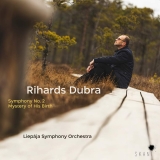 Rihards Dubra: Symphonie Nr. 2 + Mystery of His Birth; Liepaja Symphony Orchestra, Atvars Lakstigala; 1 CD Skani LMIC080; Aufnahme 2015, Veröffentlichung 08/05/2020 (48') - Rezension von Remy Franck
Rihards Dubra: Symphonie Nr. 2 + Mystery of His Birth; Liepaja Symphony Orchestra, Atvars Lakstigala; 1 CD Skani LMIC080; Aufnahme 2015, Veröffentlichung 08/05/2020 (48') - Rezension von Remy Franck
Der 1946 geborene lettische Komponist Rihards Dubra ist vor allem als Pädagoge und Kirchenmusiker tätig. Er hat entsprechend viel geistliche Musik geschrieben.
Die Inspiration für die Zweite Symphonie bezieht der Komponist aus dem Buch der Offenbarung und der in ihm enthaltenen Mystik. Die Musik klingt in der Tat in den Sätzen Visio und Cantus oft mystisch und ätherisch, im dritten Satz, Et Vidi…, aber auch apokalyptisch, so daran erinnernd, dass das letzte Buch des Neuen Testaments manchmal auch Apokalypse genannt wird. Weil das prophetische Buch auch eine Trost- und Hoffnungsschrift während der Christenverfolgungen im Römischen Reich war, lässt Dubra seine Symphonie recht positiv enden, wenngleich ein abschließender Gongschlag als eine Art Warnung anzusehen ist.
Mystery of His Birth dreht sich um die Weihnachtsgeschichte und ist für großes Orchester und Solocello geschrieben (Solist: Eriks Kirsfelds).
« Die Musik ist wie eine gedämpfte Darstellung dessen, was in dieser wundersamen Nacht passierte », sagt der Komponist. Die Musik fließt anfangs sehr ruhig, ohne durch die das Orchester überlagernden Glockenklänge transparent zu werden, während der zweite Teil freudiger und extrovertiert weihnachtlicher klingt, aber auch für mein Empfinden überinstrumentiert und enervierend laut. Die Symphonie Nr. 2 ist viel zugänglicher und eindrucksvoller.
Beide Werke werden vom Liepaja Symphony Orchestra auf solidem Niveau gespielt.
Latvian composer Rihards Dubra (*1946) is primarily active as a teacher and church musician. He has written a corresponding amount of sacred music. For the Second Symphony the composer got inspired by the Book of Revelation and its mysticism. Indeed, the music often sounds mystical and ethereal in the movements Visio and Cantus, while in the third movement, Et Vidi…, it is apocalyptic, so reminiscent that the last book of the New Testament is sometimes called the Apocalypse. Just as the prophetic book was a book of consolation and hope during the persecutions of Christians in the Roman Empire, Dubra lets his symphony end quite positively, although a final gong stroke is to be seen as a kind of warning.
Mystery of His Birth is about the Christmas story and is written for large orchestra and solo cello (soloist: Eriks Kirsfelds).
« The music is like a subdued account of what happened on that wondrous night, » the composer says. The music flows very calmly at first, without becoming transparent because of the bell sounds overlapping the orchestra, while the second part sounds more joyful and Christmassy. Yet, for my feelings, it is over-instrumented and loud. The Symphony No. 2 is much more accessible and impressive.
Both works are well played by the Liepaja Symphony Orchestra.
























